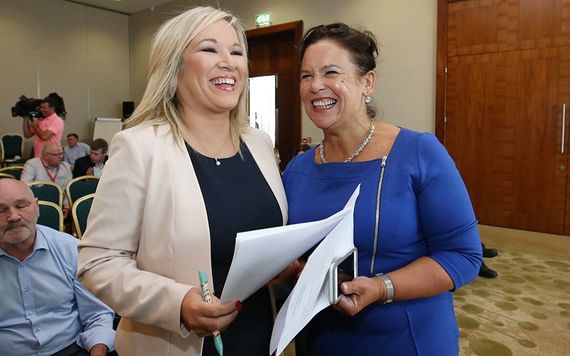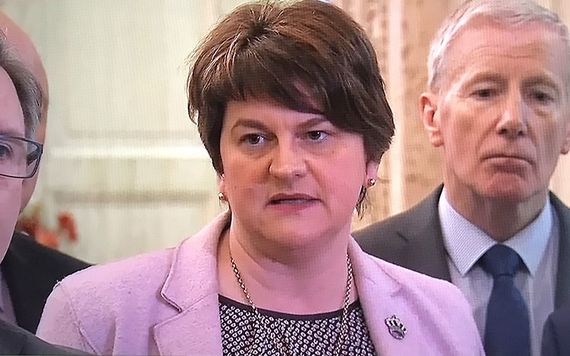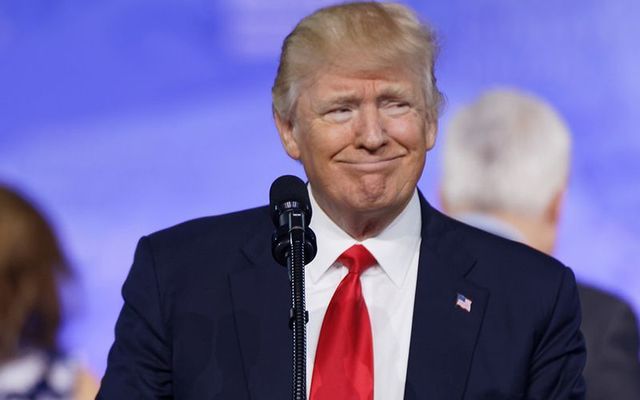Not having two main Northern Irish leaders at Donald Trump's White House St. Patrick's Day celebrations is major error.
The decision by the Trump administration to bar the leaders of Northern Ireland’s two largest political parties -- Michelle O’Neill from Sinn Fein and Arlene Foster from the Democratic Unionist Party (DUP) -- from the White House for the St. Patrick’s Day festivities on March 15 is a major mistake.
In their place, the administration has invited former Sinn Fein leader Gerry Adams and Ian Paisley Junior, a Westminster MP but a marginal figure in the DUP.
It is as if someone looked at the proposed invitation list and picked the two names that were most familiar.
Seeking to punish the North’s two main parties, Sinn Fein and the DUP, because they have not resolved their differences is naïve and ultimately will backfire.

Northern Ireland Sinn Fein leader Michelle O'Neill with party President Mary Lou McDonald.
How many times in the past have we seen the threat of losing White House access used against Adams to utterly no avail?
Anyone who knows Northern Ireland politics knows that there is a cultural victimhood on both sides that these kinds of snubs merely play into.
Though he ousted Secretary of State Rex Tillerson on Tuesday morning, President Trump is about to appoint a White House special envoy to the North and a new U.S. ambassador to Ireland.
Read more: Leo Varadkar to invite Trump to Ireland
The envoy in particular could play a major role in helping restart the dormant Assembly. Certainly, if he or she is of the caliber of a George Mitchell or a Richard Haass, there would be grounds for real hope that the impasse can be overcome.
However, whether in the Middle East or dealing with Iran, this administration has conducted a big stick policy which has left the Israeli-Palestinian dispute worse than ever. The failure of the PLO to even meet with American representatives is a sign of what happens when one-sided diplomacy is carried out.
Northern Ireland is not at the same difficult level as the Middle East, and is clearly solvable. What is needed is not a boycott of the parties, but a bringing together of the two leaders, O’Neill and Foster, to advance progress.

DUP leader Arlene Foster.
It is clear that the outside the box perspective that Americans bring to the table is what is needed now. Despite exhaustive talks and agreements that came apart at the last moment, there is no reason for all out pessimism in the North.
The issue of the Irish language which has proved to be a stumbling block is easier to resolve than, say, policing or disarmament, two issues that bedeviled the Irish peace process in years past.
There is no doubt that the Trump administration is acting in good faith in appointing an Irish envoy, but seeking to punish both sides in the meantime is a very poor strategy.
Read more: Irish leader launches scholarship thanking Choctaw Nation for famine relief
Foster and O’Neill represent a new generation of politicians. Both are female, articulate and have beaten the odds to become leader of their parties.
They of all people must bring the right attitude to the table that the problems can be solved by negotiation. Foster in particular must show that she is in control of her party and is able to deliver.

The White House fountain dyed green for St. Patrick's Day.
Just recently, when the stalemate appeared on the cusp of being resolved Foster pulled back, a victim once again, unable to sell the deal to her own party.
Northern Ireland has come such a long way, and the current dispute is likely the last one…if it can be overcome.
There is no possibility of a return to violence, but the political landscape must be reshaped, and unionists must realize that they are barely in the majority, the DUP holding only a one seat advantage over Sinn Fein.
That is a signal for a real joint government, not one where one side or the other is dominant.
The White House should have grasped the opportunity to have both party leaders from the North meet in a neutral setting. That chance has now been lost.
However, it looks likely that the name of the new envoy will be announced on the 15th, and hopefully that person will initiate a new start and a new negotiating process on both sides.
Read more: Sean Hannity on his Irish roots and Trump’s great America




Comments